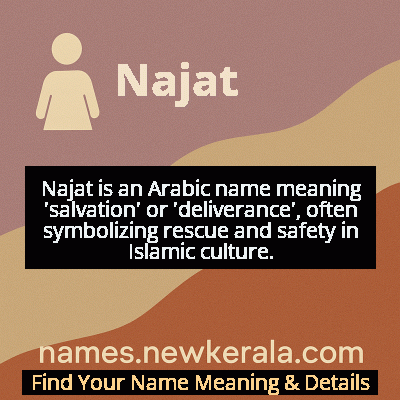Najat Name Meaning & Details
Origin, Popularity, Numerology Analysis & Name Meaning of Najat
Discover the origin, meaning, and cultural significance of the name NAJAT. Delve into its historical roots and explore the lasting impact it has had on communities and traditions.
Name
Najat
Gender
Female
Origin
Muslim
Lucky Number
1
Meaning of the Name - Najat
Najat is an Arabic name meaning 'salvation' or 'deliverance', often symbolizing rescue and safety in Islamic culture.
Najat - Complete Numerology Analysis
Your Numerology Number
Based on Pythagorean Numerology System
Ruling Planet
Sun
Positive Nature
Leaders, ambitious, highly driven, self-reliant, innovative.
Negative Traits
Overly aggressive, domineering, impatient, selfish.
Lucky Colours
Red, orange, gold.
Lucky Days
Sunday.
Lucky Stones
Ruby, garnet.
Harmony Numbers
2, 3, 9.
Best Suited Professions
Entrepreneurs, managers, engineers.
What People Like About You
Courage, determination, leadership.
Famous People Named Najat
Najat Vallaud-Belkacem
Politician
First woman to serve as France's Minister of Education and Minister of Women's Rights
Najat al-Saghira
Singer and Actress
Iconic Egyptian singer and actress with over 200 songs and 20 films
Najat Aatabou
Singer
Moroccan singer known as 'The Lioness of the Atlas' for her powerful voice and feminist themes
Najat Kaanache
Chef
Internationally acclaimed Moroccan chef featured on Netflix's 'Chef's Table'
Name Variations & International Equivalents
Click on blue names to explore their detailed meanings. Gray names with will be available soon.
Cultural & Historical Significance
In many Muslim communities, naming a daughter Najat expresses parents' hopes for her to achieve both worldly safety and spiritual salvation. The name gained particular prominence during the 20th century as Muslim societies underwent significant social changes, with parents choosing names that reflected both traditional values and aspirations for their daughters' protection and success in modern society. The name also appears in various forms across the Muslim world, from the Arabic-speaking Middle East to Persian and Turkish-speaking regions, demonstrating its widespread cultural resonance.
Extended Personality Analysis
Women named Najat are often perceived as resilient, protective, and deeply compassionate individuals. They typically exhibit strong leadership qualities combined with a nurturing nature, making them natural caregivers and problem-solvers in their communities. Their name's meaning of 'safety' often manifests in their personality through a strong sense of responsibility toward protecting others and creating secure environments. Najats are known for their emotional intelligence and ability to navigate challenging situations with grace and wisdom.
These women often possess a calm demeanor that can soothe others in times of distress, earning them reputations as peacemakers and trusted confidantes. Many Najats demonstrate remarkable perseverance through adversity, embodying the very concept of deliverance that their name represents. Their strength is typically balanced with warmth and approachability, making them effective in both professional leadership roles and personal relationships. The name seems to attract or cultivate individuals who are both grounded and aspirational, practical yet idealistic, creating a unique blend of characteristics that serve them well in various life circumstances.
Modern Usage & Popularity
In contemporary times, Najat remains a popular choice among Muslim families worldwide, though its usage patterns have evolved significantly. The name maintains strong popularity in North African countries like Morocco, Algeria, and Tunisia, while also being common in Middle Eastern nations such as Lebanon, Syria, and Jordan. In Western countries with significant Muslim populations, particularly France, the United Kingdom, and Canada, Najat has gained recognition through prominent figures like French politician Najat Vallaud-Belkacem. The name's appeal lies in its beautiful meaning, easy pronunciation across languages, and cultural authenticity. While not among the top 100 most popular names in most countries, it maintains steady usage among families seeking traditional yet meaningful Arabic names. Recent decades have seen the name adopted by some non-Muslim families attracted to its positive meaning and melodic sound, particularly in multicultural urban centers where Arabic names are increasingly appreciated for their depth and beauty.
Symbolic & Spiritual Meanings
Beyond its literal translation of 'safety,' Najat carries rich symbolic meanings that resonate across cultural contexts. The name symbolizes spiritual redemption and the journey from darkness to light, reflecting the Islamic concept of deliverance from sin and error. It represents the idea of finding safe harbor in turbulent times, making it a name that embodies hope and resilience in the face of adversity. Symbolically, Najat can be seen as representing the bridge between earthly struggles and divine protection, between human vulnerability and spiritual strength. In metaphorical terms, the name suggests a guiding light that leads others to safety, a calming presence in storms, and the promise of new beginnings after periods of difficulty. These symbolic layers make Najat not just a personal identifier but a meaningful statement about human aspiration toward security, peace, and ultimate salvation. The name serves as a constant reminder that safety and deliverance are not just physical states but spiritual achievements worth pursuing throughout one's life journey.

